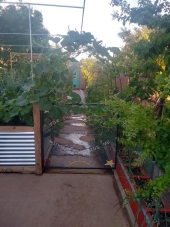A few thoughts to make gardening easier.
Only grow things you would want to eat.
Not to say don't experiment to see if you might like something.
Know what grows which season.
Beware of some of the advice on google ( AI slop with incorrect info) and some Youtube "influencers."
Papers from universities are usually a safe bet for how to.
Find out what is fairly bulletproof to grow in your area. If you're in the gulf coast/southeast this may help:
https://permies.com/t/273727/starter-seeds-pack-gardeners#2863960
It's a lot of work to get the ground ready. Perhaps consider starting out with a very basic Kratky hydroponic setup.
This can even be done in the city under grow lights or out on a balcony.
There are LED grow lights now which run quite economically.
Best I've found are Barrina brand on Amazon. I like the full spectrum white ones.
Hydroponic is usually not organic (could be but difficult) but much easier to do with positive beginner results more likely.
Lettuce and micro dwarf tomatoes are easily grown indoors.
Buy seed from quality suppliers. A few suggestions:
Johnny's
True Leaf Market
Baker Creek
Tomato Growers Supply
Southern Exposure
Burrell
Harris
Seeds and Such
Individual sellers on Ebay and Etsy with just a few things offered. Avoid the big sellers.
Avoid the seed racks in stores, poor quality seed.
That's the short list, there are other good ones out there.
Seed definitely acclimates to local geography so the closer your source is to you the better.
Read Steve Solomon's Gardening When it Counts. If I had to pick one book for a beginner this would be it.
This also covers less than optimal conditions, drought, etc. and what to do then.
Also soil prep.
My usual routine on soil prep is to broadfork the bed then a few inches of compost and whatever fertilizer on top. If you dig the compost in here (sand) it disappears too quickly.
I'm experimenting with using transplants into beds that were covered in wood chips and that looks good so far.
I plant into a post hole digger hole with a couple shovel fulls of compost mixed in with the soil and ferts on top and the soil around the hole loosened up with a fork after digging the hole but before planting.
The idea is to cut down on labor required and being able to prep and plant in increments instead of having to prep an entire bed first. I think in the end I'll plant and lay down wood chips at the same time, gradually moving through the bed.
Keep the wood chips on top of the soil or they'll rob nitrogen decomposing and disappear more quickly.
Microorganisms are a big help. Compost tea or some of the JADAM simpler liquid ferts like the one with forest mold and a potato ferment are good for this.
Be thinking about ways to make it easier on yourself.
If you're considering fruit trees/shrubs Tree Crops by J. Russel Smith is a good place to start.
https://archive.org/details/TreeCrops-J.RussellSmith
Always check how many chill hours will be required. This was one of my early big mistakes.
Try to find a good nursery close by and take note of what they don't carry or ask for advice.
My classic mistake along these lines was planting a row of pomegranates not knowing they will never bring fruit to ripe here due to a local virus taking them out, no exceptions so far. A highly skilled nurseryman was kind enough to point this out to me. This saved me years of wondering why no fruit ever making it to being ripe.
I might suggest starting with figs and mulberries. They grow easily and are easy to propagate more from cuttings. There are even midget varieties of both. Look up Mojo Mulberry and Fignominal Fig.
Like the seeds, buy the trees as close to home as possible. Same reason as the seeds, local stuff will grow faster/better. When you're looking at 3 - 5 years until fruit this makes a big difference.
Ask the old timers if you can find them.
Classic examples of that nearly forgotten here are that you're not safe from freeze until after Easter.
And....
Watch the hickory or pecan trees for leafing out if you're trying to beat the clock on putting in frost sensitive stuff. If those trees are beginning to leaf it will be a very rare event that you get frost after that.







 11
11





 9
9




 7
7




 7
7





 9
9










 6
6




 2
2




 5
5










